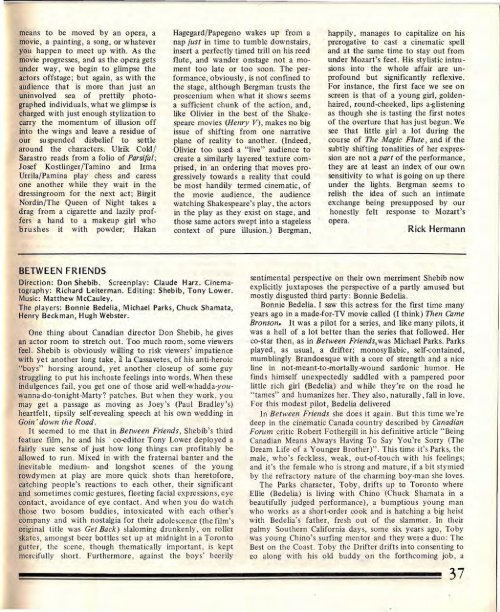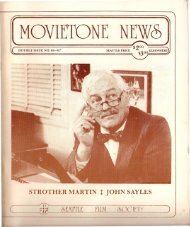MOVIETONE NEW8 . - Parallax View Annex
MOVIETONE NEW8 . - Parallax View Annex
MOVIETONE NEW8 . - Parallax View Annex
You also want an ePaper? Increase the reach of your titles
YUMPU automatically turns print PDFs into web optimized ePapers that Google loves.
means to be moved by an opera, a<br />
movie, a painting, a song, or whatever<br />
you happen to meet up with. As the<br />
movie progresses, and as the opera gets<br />
under way, we begin to glimpse the<br />
actors offstage; but again, as with the<br />
audience that is more than just an<br />
uninvolved sea of prettily photographed<br />
individuals, what we glimpse is<br />
charged with just enough stylization to<br />
carry the momentum of illusion off<br />
into the wings and leave a residue of<br />
our suspended disbelief to settle<br />
around the characters. Ulrik Cold/<br />
Sarastro reads from a folio of Parsifal;<br />
Josef Kostlinger/Tamino and Irma<br />
Urrila/Pamina play chess and caress<br />
one another while they wait in the<br />
dressingroom for the next act; Birgit<br />
Nordin/The Queen of Night takes a<br />
drag from a cigarette and lazily proffers<br />
a hand to a makeup girl who<br />
bru shes it with powder; Hakan<br />
BETWEEN FRIENDS<br />
Direction: Don Shebib , Screenplay: Claude Harz. Cinematography:<br />
Richard Leiterman. Editing: Shebib, Tony Lower.<br />
Music: Matthew McCauley.<br />
The players: Bonnie Bedelia, Michael Parks, Chuck Shamata,<br />
Henry Beckman, Hugh Webster.<br />
One thing about Canadian director Don Shebib, he gives<br />
an actor room to stretch out. Too much room, some viewers<br />
feel. Shebib is obviously willing to risk viewers' impatience<br />
with yet another long take, a la Cassavetes, of his anti-heroic<br />
"boys" horsing around, yet another closeup of some guy<br />
struggling to put his inchoate feelings into words. When these<br />
indulgences fail, you get one of those arid well-whadda-youwanna-do-tonight-Marty?<br />
patches. But when they work, you<br />
may get a passage as moving as Joey's (Paul Bradley's)<br />
heartfelt, tipsily self-revealing speech at his own wedding in<br />
Goin/ down the Road.<br />
It seemed to me that in Between Friends, Shebib's third<br />
feature film, he and his' co-editor Tony Lower deployed a<br />
fairly sure sense of just how long things can profitably be<br />
allowed to run. Mixed in with the fraternal banter and the<br />
inevitable medium- and longshot scenes of the young<br />
rowdy men at play are more quick shots than heretofore,<br />
catching people's reactions to each other, their significant<br />
and sometimes comic gestures, fleeting facial expressions, eye<br />
contact, avoidance of eye contact. And when you do watch<br />
those two bosom buddies, intoxicated with each other's<br />
company and with nostalgia for their adolescence (the film's<br />
original title was Get Back) slaloming drunkenly, on roller<br />
skates, amongst beer bottles set up at midnight in a Toronto<br />
gutter, the scene, though thematically important, is kept<br />
mercifully short. Furthermore, against the boys' beerily<br />
Hagegard/Papegeno wakes up from a<br />
nap just in time to tumble downstairs,<br />
insert a perfectly timed trill on his reed<br />
flute, and wander onstage not a moment<br />
too late or too soon. The performance,<br />
obviously, is not confined to<br />
the stage, although Bergman trusts the<br />
proscenium when what it shows seems<br />
a sufficient chunk of the action, and,<br />
like Olivier in the best of the Shakespeare<br />
movies (Henry V), makes no big<br />
issue of shifting from one narrative<br />
plane of reality to another. (Indeed,<br />
Olivier too used a "live" audience to<br />
create a similarly layered texture comprised,<br />
in an ordering that moves progressively<br />
towards a reality that could<br />
be most handily termed cinematic, of<br />
the movie audience, the audience<br />
watching Shakespeare's play, the actors<br />
in the playas they exist on stage, and<br />
those same actors swept into a stageless<br />
context of pure illusion.) Bergman,<br />
happily, manages to capitalize on his<br />
. prerogative to cast a cinematic spell<br />
and at the same time to stay out from<br />
under Mozart's feet. His stylistic intrusions<br />
into the whole affair are unprofound<br />
but significantly reflexive.<br />
For instance, the first face we see on<br />
screen is that of a young girl, goldenhaired,<br />
round-cheeked, lips a-glistening<br />
as though she is tasting the first notes<br />
of the overture that has just begun. We<br />
see that little girl a lot during the<br />
. course of The Magic Flute, and if the<br />
subtly shifting tonalities of her expression<br />
are not a part of the performance,<br />
they are at least an index of our own<br />
sensitivity to what is going on up there<br />
under the lights. Bergman seems to<br />
relish the idea of such an intimate<br />
exchange being presupposed by our<br />
honestly felt response to Mozart's<br />
opera.<br />
Rick Hermann<br />
sentimental perspective on their own merriment Shebib now<br />
explicitly juxtaposes the perspective of a partly amused but<br />
mostly disgusted third party: Bonnie Bedelia.<br />
Bonnie Bedelia. I saw this actress for the first time many<br />
years ago in a made-for-TV movie called (I think) Then Came<br />
Bronson. It was a pilot for a series, and like many pilots, it<br />
was a hell of a lot better than the series that followed. Her<br />
co-star then, as in Between Friends, was Michael Parks. Parks<br />
played, as usual, a drifter; monosyllabic, self-contained,<br />
mumblingly Brandoesque with a core of strength and a nice<br />
line in not-meant-to-mortally-wound sardonic humor. He<br />
finds himself unexpectedly saddled with a pampered poor<br />
little rich girl (Bedelia) and while they're on the road he<br />
"tames" and humanizes her. They also, naturally, fall in love.<br />
For this modest pilot, Bedelia delivered<br />
In Between Friends she does it again. But this time we're<br />
deep in the cinematic Canada country described by Canadian<br />
Forum critic Robert Fothergill in his definitive article "Being<br />
Canadian Means Always Having To Say You're Sorry (The<br />
Dream Life of a Younger Brother)". This time it's Parks, the<br />
male, who's feckless, weak, out-of-touch with his feelings;<br />
and it's the female who is strong and mature, if a bit stymied<br />
by the refractory nature of the charming boy-man she loves.<br />
The Parks character, Toby, drifts up to Toronto where<br />
Ellie (Bedelia) is living with Chino (Chuck Shamata in a<br />
beautifully judged performance), a bumptious young man<br />
who works as a short-order cook and is hatching a big heist<br />
with Bedelia's father, fresh out of the slammer. In their<br />
palmy Southern California days, some six years ago, Toby<br />
was young Chino's surfing mentor and they were a duo: The<br />
Best on the Coast. Toby the Drifter drifts into consenting to<br />
eo along with his old buddy on the forthcoming job, a<br />
37




